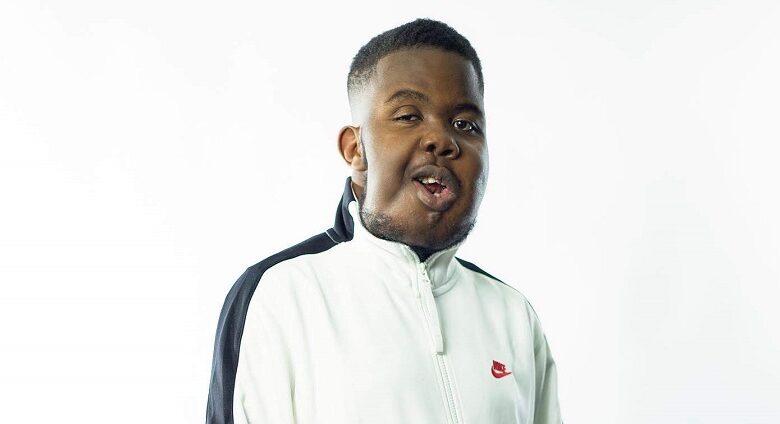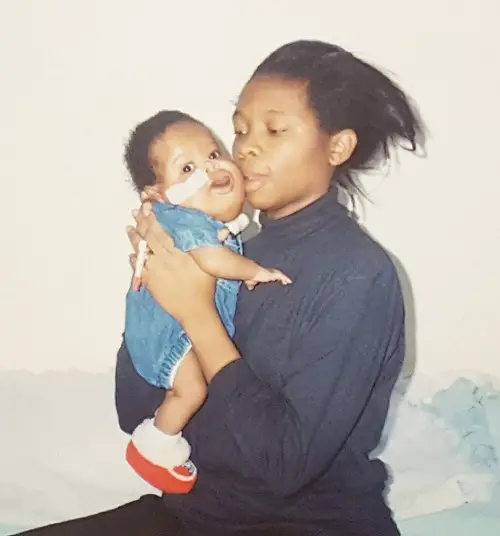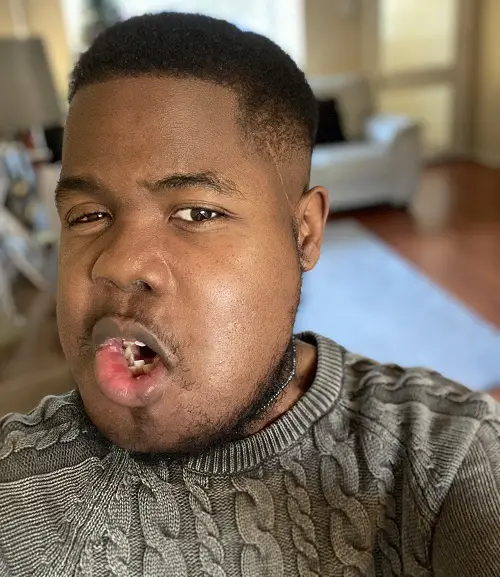
Olu Fadipe: how I want to be a role model for men with facial disfigurement
Olu Fadipe, who is a campaigner and ambassador for Changing Faces, spent his childhood struggling with emotions surrounding his facial disfigurement and feeling like the only one. Now, as an adult, he wants to be a role model for other men like him, living with a visible difference.
Read our news story on Changing Faces’ survey of more than 1,000 men with a visible difference and how it affects their mental health.
My name is Olu Fadipe. I was born with a medical condition called Cystic Hygroma (Lymphatic malformations). In layman’s terms, I have cysts that form where I have lymph nodes, due to malformations in my lymphatic system.
Due to the nature of my medical condition, I’ve had so many medical procedures that I’ve lost count. I was regularly in and out of the hospital for the first 13 years of my life.
In the early 2000s, most of my major procedures were to improve my visible difference and to give me a better quality of life.
This is something that I will always be grateful for, but this was of course difficult. It would be for any child who was to undergo multiple medical procedures from such a young age, for both themselves and those around them.
Personally, though, the real challenge wasn’t the medical procedures, but it was the mental aspect of growing up with a visible difference. This would often involve trying to deal with other people’s reactions in public (looks, name-calling etc), but also just trying to accept my medical condition.
As a kid, it is difficult enough just trying to understand your emotions. For me, it was even more difficult as I couldn’t communicate or express how my visible difference (or treatment because of it) made me feel.
When I was younger, I would get angry easily, especially at home. At school, however, depending on who you ask, some might say I was an angel… because I was!
But on a more serious note, I think that attending a special needs school helped because I was more comfortable being with other disabled children.
Even though I went to a school for children with disabilities, I still couldn’t help but feel like I was in a bubble. I still felt like I was the only one who looked different.

Of course, due to the nature of having a disability, everyone had differences. However, there were a lot of common attributes e.g. being in a wheelchair, but there was nobody with a visible difference similar to myself.
Whilst I was perfectly comfortable in my school environment, I did not know, nor was friends with anyone who had a visible difference like myself. I did not have anyone to look up to, and I think for me that’s one vital thing I wish I had as a kid.
I wish I had someone who had gone through something similar, and that I could have looked up to, such as Adam Pearson who I now greatly admire.
I wish social media was more advanced back in my school days, and that I could have been part of Facebook groups, communicating with people with the same conditions (or similar).
Unfortunately, that was not the case, but eventually, as I got older, I did learn to accept who I was and consequently my medical condition.
Honestly, one of the biggest things that helped me get through everything was the rapper Eminem. Mainly because of how he ‘owned his shit’ – excuse my language, but it’s true!

For example, his final rap battle scene in the film 8 Mile, where he used advantageous self-deprecation in order to address a power imbalance between himself and his opponent. A pre-emptive strike if you will.
Everything his opponent was going to say about him, he already said. That left his opponent powerless, with nothing to say or insult him about.
That sort of ideology has helped me throughout life: “Sure I have a big head… but I know and own that so you can’t hurt me”.
That helped me on my journey to self-acceptance. As a kid the visible difference owned me, and now I own the visible difference.
I’m going to end this piece by saying something I wish I heard when I was a kid. In your general day-to-day life, visible differences aside, find yourself as a person and own who you are. Most importantly, do not let other people tell you otherwise.
By Olu Fadipe for Changing Faces
You can get in touch with Olu and follow him by visiting his blog, Facebook page, Twitter @oafadipe and Instagram @mrfadipe.
More on Disability Horizons…